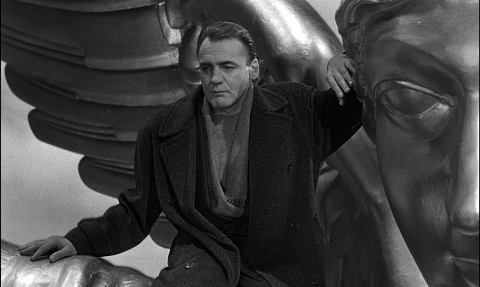BG
Bruno Ganz has died. He wasn't that well known to American audiences since most of his appearance were in German-language films. Still, to a lot of film fans, he was one of the most fascinating actors of his day.
Oddly, he achieved a certain type of immortality for playing Adolf Hitler in Der Untergang, or Downfall (2004). Not that so many people saw this film about Hitler's final days in the bunker--though they should, it's a fine movie. Instead, the scene where he rants to his top command has been used in hundreds of parodies, where the subtitles are changed so that Hitler is complaining about all sorts of modern phenomena.
But while Hitler was one of his best roles, Ganz did so much more. For instance, there's Wim Wenders' cult classic The American Friend (1977), where he plays a picture framer who believes he's dying and gets involved in murder. He's put up to it by Tom Ripley (Patricia Highsmith's character, better known for The Talented Mr. Ripley), played by Dennis Hopper. It's a stylish modern noir, though kind of grim, and Ganz is at the top of his game.
Perhaps Ganz' best-known role, if you don't include YouTube, is in Wenders' Wings Of Desire (1987). (I prefer the German title Der Himmel uber Berlin.) Ganz plays Damiel, an angel who wanders around Berlin, secretly observing and sometimes comforting its people. It's not enough for him, so he becomes a person to feel what it's like to be human. It's a very touching film about love and life. Ganz reprised the role in Faraway, So Close! (1993) but the magic isn't quite there.
Ganz also appeared in English-language films, such as Jonathan Demme's remake of The Manchurian Candidate (2004), Francis Ford Coppola's Youth Without Youth (2007) and Stephen Daldry's The Reader (2008). The most recent performance I saw of his was as the spiritual Gottfried in Sally Potter's The Party (2017), though the always busy Ganz made a handful of films after that.
In fact, he appeared in over 100 films, so though he's gone, there's still plenty to discover.



1 Comments:
Downfall was spectacular. American movies have featured Nazis for half a century, but German cinema avoided portraying Hitler, because the real Hitler was quite charismatic, and thus any realistic portrayal risked making Nazism seem attractive.
Finally, producer/screenwriter Bernd Eichinger realized that a film about Hitler's final days was the answer: by that time Hitler's erratic behavior (and madness?) were so pronounced that he figured no viewers would find him an attractive character.
It also gives a great look at how everyone in the bunker was walking on eggshells. Above the ground, Germany was being devastated by the Allies, but any general who dared to tell the truth about how the war was going would cause Hitler to fly into a rage.
Ganz was lucky that he wasn't typecast after the film. He really did look a lot like Hitler.
Post a Comment
<< Home